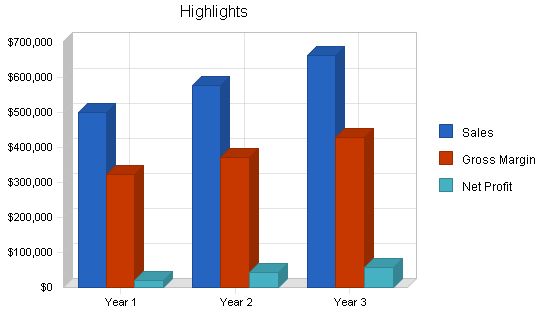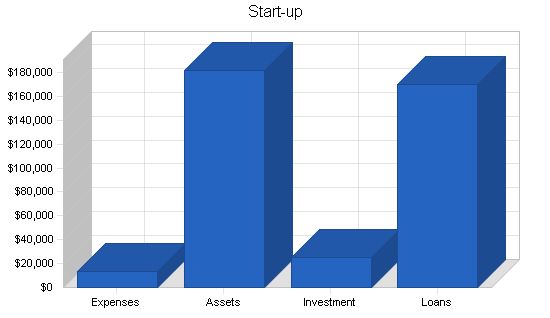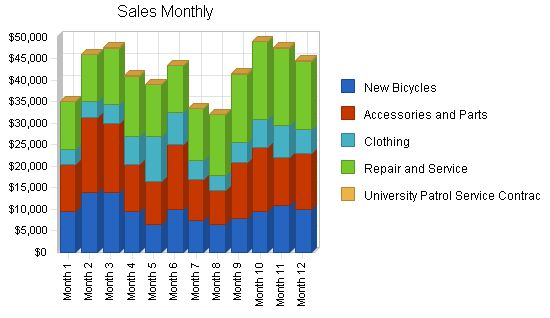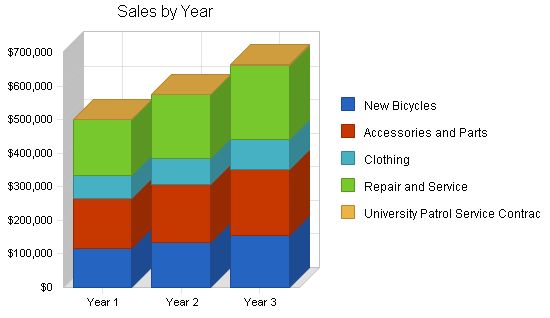Retail Bicycle Shop Business Plan
University Cycle Works is an established specialty store, offering retail sales of bicycles, parts, accessories, clothing, and maintenance and repair service. It is located in a heavily trafficked university area.
The primary market for University Cycle Works is the university student population, which has an annual turnover/growth of approximately 25%. The secondary market is the university faculty and staff, and the tertiary market is the greater Metroburg community.
Hubert “Hub” Freewheeler has been the assistant manager of University Cycle Works for five years, and has seven additional years of retail sales and service experience in the bicycle industry. Hub first began investigating the ownership of a bike business two years ago, however, the local Metroburg market seemed saturated with shops. Realizing that a more practical option would be to buy an existing shop, Hub approached his current boss. The result of two years of negotiations will be the sale of University Cycle Works to Hub, taking effect July 1, 2001. The goal will be a seamless transfer of ownership, with staff, bike lines, location, and operations unchanged.
This business plan is being prepared for presentation to Metroburg Business Bank and the store’s major suppliers of new bicycles, accessories, and parts. A substantial part of the past year’s planning has been negotiations with these suppliers to maintain the current financial agreements as the business changed hands. These negotiations benefited greatly from the good working relationships Hub had developed with the various suppliers’ sales representatives, who advocated on Hub’s behalf. The suppliers have provisionally granted continuation of existing terms and dating programs, pending review of this business plan.
Note: Names, proprietary information, and some financials have been disguised in this sample plan.

1.1 Objectives
The objectives for University Cycle Works are:
- Continue to provide high-quality sales and services.
- Manage a seamless transfer of ownership.
- Maintain a financially healthy business and validate trust and advocacy.
- Repay the start-up loan provided by family members within the first year.
- Achieve monthly and yearly sales equal to or better than the previous year.
- Improve sales of bicycle-specific garments and rainwear.
- Focus marketing on new student influx to maintain growth in sales and service revenue.
1.2 Keys to Success
Our premier, high visibility location adjacent to the State University in Metroburg has been critical to our success as the bicycle sales and service purveyor of choice to the university community.
The continuance of established accounts payable, sales programs, and co-op advertising resources by suppliers makes the financial plan reasonable and attainable. Without this support, the purchase of the business would be unacceptably risky.
Buying and continuing to use the recognized, well-respected name University Cycle Works provides continuity for customers, the owner, and the employees.
Retaining and promoting the current employees of the shop is as important as any other item here. They are the life of University Cycle Works. Long-term relationships with customers have always been a hallmark of the University Cycle Works experience. We recognize and address our customers by name and want to be part of their university experience.
Company Summary
University Cycle Works is a subchapter S corporation owned by Han Delbar. Hubert “Hub” Freewheeler, current assistant manager, is purchasing University Cycle Works from Delbar, acquiring inventory, assuming accounts payable and dating program debts, location lease, customer base and information, and the business name and goodwill. Exchange of ownership will occur on July 1 of this year.
To establish an accurate accounting of existing inventory and outstanding debts, the prior year’s closing inventory and year-end financial statement were used as benchmarks. The sales, orders placed, deliveries received, and accounts payable payments made have been tracked each month, and a trial balance of these will be run June 15 to establish the final purchase price for inventory on hand and the amount of Accounts Payable assumed. The figures presented here are conservative, realistic estimates used for planning purposes.
2.1 Start-up Summary
The current owner, Han Delbar, has sold the business to Hub for $140,000. To help determine this price, a business valuation specialist was hired. This professional priced existing store fixtures, tools, and mobile leasehold improvements, including bicycle wall racks, display cases, track lighting, repair and assembly tools, supply cabinets and storage shelving, air compressor, etc., as part of the purchase price.
The value of the existing company, its reputation, assumption of the business name, existing client base, etc. is recognized as part of the purchase. It appears as a start-up expense in the following table as Down Payment. The balance appears as a long-term liability. Additional payments shall be made monthly.
Inventory, accounts payable, and invoices were tracked for five months to determine an accurate price of current inventory and amounts of accounts payable assumed.
A deposit equal to one month’s rent was required by the landlord as assurance in continuing the current lease to the new owner. It appears as a short-term asset.
Hub is investing some of his own money, partially a home equity loan, in the company. An additional amount is being invested, as short-term interest-free loans, by family members. This plan calls for these loans to be repaid in the first year.

University Cycle Works is located in Metroburg, a major city with a university campus. The store is in a premier location near campus and is the major supplier of bicycles, accessories, and repair services to university students and staff. The store is 2,000 sq. ft. with covered outside space for displaying used bicycles. A hose and air compressor are available for walk-in customers. University Cycle Works offers new bicycles, predominantly in the mountain bike style, retro-cruiser as a close second, and sport/touring/racing road bikes as a distant third. They also sell used bikes and provide various services such as tune-ups, repairs, installations, and warranty repairs. The store carries three mainstream bike lines (Specialized, Kona, and Raleigh/Diamondback) and three specialty brands (Terry Precision Bicycles, Litespeed Titanium, and Via Porco). They also stock parts and accessories from various suppliers such as Quality Bicycle Products, Trek Bicycle Corporation, United Bicycle Parts, and United Bicycle Tools. In addition, University Cycle Works sells bicycling clothing from brands like Burley Design, Pearl Izumi, Sierra Designs, and Trek Bicycle Corporation. The store keeps up with the latest trends in technology and futuristic products in the bicycle industry. The main market segment for University Cycle Works is university students, who use bicycles as inexpensive transportation due to the lack of parking in the area. The store also serves university employees and the greater Metroburg population.

Potential Customers Growth Year 1 Year 2 Year 3 Year 4 Year 5 CAGR
University Students 4% 27,500 28,600 29,744 30,934 32,171 4.00%
University Employees 1% 6,500 6,533 6,566 6,599 6,632 0.50%
Greater Metroburg Population 2% 160,000 163,200 166,464 169,793 173,189 2.00%
Other 0% 2,000 2,000 2,000 2,000 2,000 0.00%
Total 2.22% 196,000 200,333 204,774 209,326 213,992 2.22%
4.2 Target Market Segment Strategy:
We’ve chosen our target market segments, the greater university population because:
– They are contained in one area with a high daily population density.
– Easily reached with advertising, such as outdoor displays on main street next to campus.
– Have discretionary income.
– Have a regular turnover of population/influx of new potential customers.
– Are, in general, athletically/physically active and often performance-oriented.
– In need of quick, efficient, maneuverable, alternative transportation.
– Enjoy toys, especially expensive ones.
– Are image and brand conscious.
– Respond to convenience, especially highly visible, easy access convenience, with impulsive purchases.
4.2.1 Market Trends:
Trends in the bicycle industry usually last for a time. Some of them have been:
– 1960s – Big rush on 10 speeds.
– 1970s – Touring bikes became popular.
– 1980s and 1990s – Huge growth of mountain bikes.
– 1990s – The exaggerated death of “road bikes” and the unfulfilled prophesy of a boom in the tandem market.
– 2000s – Popularity of retro ‘cruisers.’
4.2.2 Market Growth:
The bulk of University Cycle Works’ market growth is the regular matriculation of students from the State University in Metroburg. While the overall market numbers change in small increments, usually less than 10%, the market has a turnover of 22-26% yearly. In a longer time frame, the number of students and the number of university employees grows and shrinks with economic changes and population demographics. For the next three years, we foresee slow but steady growth in the overall university population as well as continued growth of Metroburg as a desirable place to live.
4.2.3 Market Needs:
Our market niche has several needs which we strive to meet:
– Quality bikes at several price points.
– Various styles and sizes of bikes, leaning heavily toward the styles most popular with the student population.
– Range of practical accessories in the local setting, such as locks, fenders, lights, tires, seats, rainwear, etc.
– Plenty of replacement components and service parts.
– Friendly personal relationships between cyclists and shop staff.
– Prompt and convenient service, from on-the-spot flat tire fix to drop-in repairs to scheduled major maintenance.
4.3 Service Business Analysis:
The bicycle industry is a worldwide concern. The Pacific Rim is a huge producer of framesets, components, tires, and accessories. European countries have a long tradition of producing the finest road touring and racing bikes and parts. The United States has a large number of producers of high-tech, exotic metal, jewelry components, and hand-built custom framesets. Transportation of all these various pieces and fully assembled bikes across continents and oceans brings the industry its international flavor. It also adds a certain cost to all products. Interestingly enough, some of the least expensive bicycles are imported from the People’s Republic of China, and some of the most expensive pieces are made in the U.S. and hand-built in small shops that use CNC machining to make titanium bolt, nut, and screw sets.
4.3.1 Main Competitors:
Setting aside the discount department stores, University Cycle Works has the following direct competitors:
– 1 local multi-sport store at the local megamall.
– 1 statewide chain of bicycle shops that started out as Schwinn-only shops but has had to take on other brands and products.
– 1 used bike store that exclusively deals in used bikes.
– 3 local shops, including the oldest shop in town.
– 1 local multi-location chain that specializes in opening shops in small local malls in areas of new housing development.
– Several garage mechanics offering service only.
None of these competitors is within two miles of the university, so, for the present, we have first access to our chosen market segments. The two strongest competitors are the Oldest Shop in Town, which carries the cache of being the most stable and well-known, and the Mountain Bike Specialist, which targets the same athletic, young, performance and image-conscious rider that we target in the university student population.
4.3.2 Business Participants:
The bicycle industry has many players, both large and small, all over the world. A few are listed below:
Big bicycle manufacturers:
– Giant – one of the largest manufacturers in China, selling under its own name.
– Huffy – The largest manufacturer and seller of bikes in the U.S. under its own private labels.
– Cannondale – U.S. company that was in early on the “Made in USA” movement in the 1970s.
– Trek – U.S. company that offers bikes, clothes, accessories, road support for events, training for shops, and other services.
Big component manufacturers:
– Shimano – largest manufacturer of cranksets, derailleurs, drive trains, brake sets, hubs.
– Campagnolo – Premier Italian producer of the finest component gruppos for almost 100 years.
Big accessory distributors:
– Specialized
– Bell Sports
– Quality Bike Parts
Mail order/Online companies:
– Performance
– Bike Nashbar
– REI
Specialty bike stores:
– University Cycle Works, where bicycles are our focus and passion. Our staff is knowledgeable and experienced.
Custom frame builders and smaller specialized manufacturers:
– Folding bikes, tandems, trailers, racing bikes, and custom components.
Strategy and Implementation Summary:
Information on our sales and marketing efforts are discussed in the following sections.
5.1 Competitive Edge:
The foremost competitive advantage of University Cycle Works is our university location. The State University at Metroburg is over 100 years old, and as it has grown, Metroburg has grown around it. Parking is almost nonexistent with all campus parking permit or meter controlled, and local streets filled to capacity with residents’ vehicles. Bicycles are an obvious and popular transportation solution. Our location, in the first block off campus in a commercial area featuring the university Bookstore, a private bookstore, bank, cafes, coffee shops, and popular watering holes, is ideal. We get constant, daily visual exposure. Students and staff throng the sidewalk outside our door, and we reap the benefits. Our nearest competitor is almost a mile away. For the student customer, on foot, in a hurry, University Cycle Works is the immediate solution to their needs. After that first parking ticket, we are the first bike shop the new pedestrian sees. We are conveniently located when a cyclist gets a flat tire on the way to class. The first time a rider gets to class with a wet back, they come in at lunch for a set of fenders and a rain jacket. The negotiations of the past two years also bring the advantage of continued financial agreements with major suppliers. This is an advantage over a start-up bicycle shop, but is more a leveling of the bike path when compared to other established shops in Metroburg. University Cycle Works will be continuing an established system of dating programs, ordering, delivery, and invoicing/accounts payable, stabilizing our funding needs and monthly cash flow.
5.2 Marketing Strategy:
Our marketing strategy seeks to optimize our advantage of a prime location. We want the university population to see us as their bike shop – even our name says so, University Cycle Works. We want them to see us as part of their daily experience and a shop they can depend on for quick repair and maintenance service.
5.2.1 Marketing Programs:
Our marketing programs are locally focused, where we can effect our main target market.
– Back to school specials at the beginning of each term, including perhaps a free Kryptonite lock with a new bike purchase.
– Spring special, coinciding with the beginning of spring term.
– Coupons, appearing once every other month in the university newspaper and online.
– Website, featuring store information, maps, and promotions.
– Print advertising in the local newspaper to boost citywide awareness.
5.2.2 Web Plan Summary:
University Cycle Works’ website is designed to be a content site, providing locally topical information to our target markets. We work with HooDaThunkIt Search Engine Consultants to ensure favorable listings in Internet search engines.
5.2.3 Pricing Strategy:
Pricing of bicycles is very tight, with a markup of between 30% and 40% depending on the brand and model. Parts and accessories are generally keystone priced. Service charges are based on an average time for completion, with parts priced at keystone and added to the labor service charge.
5.3 Sales Strategy:
Sales vary season to season and with the academic school year. We have three large sales promotions each year: back to school in August/September, year-end holidays, and spring. We also have small monthly revenue from sales of used bicycles, repair classes, and service contracts with the university security office.


Year 1 Year 2 Year 3
Sales
New Bicycles $116,000 $133,400 $153,410
Accessories and Parts $150,000 $172,500 $198,375
Clothing $68,000 $78,200 $89,930
Repair and Service $166,000 $190,900 $219,535
University Patrol Service Contract $1,200 $1,380 $1,587
Total Sales $501,200 $576,380 $662,837
Direct Cost of Sales
Year 1 Year 2 Year 3
New Bicycles $78,880 $90,712 $104,319
Accessories and Parts $75,000 $86,250 $99,188
Clothing $23,800 $27,370 $31,476
Repair and Service $0 $0 $0
University Patrol Service Contract $0 $0 $0
Subtotal Direct Cost of Sales $177,680 $204,332 $234,982
Strategic Alliances
– Bicycle manufacturers – continuation of dating programs and financial agreements.
– Accessory suppliers – continuation of financial agreements.
– Metroburg Parks Dept. – sponsor printed map of city bike paths to publish on our website.
– University Security Office – maintenance, supply service contract for cycle security.
– HooDaThunkIt – website design and maintenance, search engine placement.
Management Summary
The current assistant manager, Hub Freewheeler, is buying University Cycle Works and will manage the business. Hub has a B.S. degree in Economics and an M.A. in Comparative Literature. His passion, however, has always been cycling. He originally worked at his local bike shop during college. After several years trying to find suitable work in his degree field, Hub gave up and decided to work with something substantial, returning to his youthful enjoyment of bicycles.
He attended two major bicycle mechanic training programs: New England Bicycle Academy and the United Bicycle Institute. These courses covered mechanical service and maintenance, frame building and repair, wheel building, and shop organization, sales, and management. He has 12 years of progressively responsible experience in bicycle shops, with the last five at University Cycle Works.
One of the other full-time employees, Vel O’Cipede, has expressed interest in learning more about the bike industry and will be promoted to the new assistant manager. Vel has been with us for three years. She graduated from State University at Metroburg with tandem B.S. degrees in Exercise Physiology and Recreation Management. She loves cycling and has kept her contacts at the university active. Her knowledge and expertise draw many women bicyclists to our store, where they know they will get the care and attention that is usually missing from traditionally male staffed shops.
The current owner, Han Delbar, will be available as a resource. Additional resources include:
– Order Out of Chaos, our full-cycle bookkeeping service.
– Continental Shelf Bank.
– Newt Ria, a partner at Weasel, Stoat, Muskrat who advised on the sale/purchase arrangements.
Personnel Plan
The staff consists of Hub Freewheeler, the new assistant manager, Vel O’Cipede, and two other full-time employees: Dee Raylure and Jean-Baptiste Kapsyze.
To meet the need for additional help during the year, University Cycle Works hires two to four part-time employees from the university population. We look for people who are enthusiastic about cycling and have a mechanical aptitude. Some of these individuals have worked for us throughout their entire college sojourn. Their hours vary depending on the store’s needs and their class schedules.
Year 1 Year 2 Year 3
Hub Freewheeler $34,800 $36,540 $60,000
Vel O’Cipede $27,000 $28,350 $30,000
Dee Raylure $23,400 $24,570 $25,799
Jean-Baptiste Kapsyze $19,800 $20,790 $21,830
Part-time Employees $18,900 $25,200 $25,200
Total People 5 7 7
Total Payroll $123,900 $135,450 $162,828
Hello!
I’m Andrew Brooks, a seasoned finance consultant from the USA and the mind behind phonenumber247.com.
My career is built on a foundation of helping individuals and businesses thrive financially in an ever-changing economic landscape. At phonenumber247.com, my aim is to demystify the complex world of finance, providing clear, actionable advice that can help you navigate your financial journey with confidence. Whether it’s personal finance management, investment strategies, or understanding the nuances of market dynamics, I’m here to share insights and tools that can propel you towards your financial goals.
Welcome to my digital space, where every piece of advice is a step closer to financial clarity and success!
